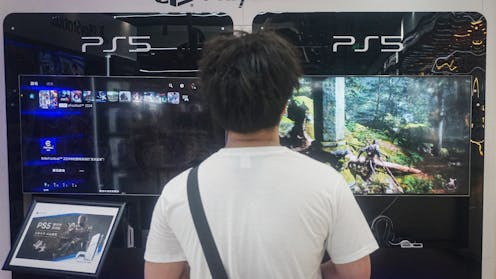Video games teach students in this class how religion works in the modern world
- Written by Michael Naparstek, Associate Teaching Professor Religious Studies, University of Tennessee

What does the course explore?
What makes this course different from many others that utilize video games is that the student experience of playing the games influences how we frame our investigation of religion. Students wrestle with questions about how religion helps build the worlds they are experiencing.
We meet in the game lab as a class once a week to observe and analyze each other’s experiences playing different kinds of games.
We start the week with relevant theoretical and historical framing in the traditional classroom. For example, in our investigation of “Black Myth: Wukong,” a game inspired by the 16th-century novel “Journey to the West[10],” students first read selections from the work as they learn about its protagonist, the trickster monkey god Sun Wukong.
In the novel, Wukong picks fights with all the gods in an attempt to overthrow the cosmic order, only to eventually be violently put in his place by the highest gods of the Chinese pantheon. Our class discussions thus serve as a general introduction to Chinese religions, while we also get to discuss the theoretical basis for culturally defined ideas such as what makes a hero.
Playing as a descendant of Sun Wukong, students explore enchanted landscapes, interact with local spirits and engage in magical combat against the very gods that we learned about in class.
Each week, students note their observations, carefully detailing their experience playing the game, as well as the experience of watching others do the same. Students are also asked to analyze the ways in which religious themes, narratives and practices played a role in the game world they experienced.
We conclude the class with weekly reflections on the overall experience.
What will the course prepare students to do?
In 2024, the video game industry boasted over US$184 billion[11] generated in market value. The global reach of games allows new audiences to experience and learn about religious narratives and practices in new ways.
Popular media has long been a powerful mode of cultural exchange. Video games are just a recent example, but the scale to which gamers around the world connect with each other through playing demands more attention.
The wild popularity following the 2024 release of the game “Black Myth: Wukong,” the first premier produced game out of China for an international audience, suggests that this kind of experience is truly a global phenomenon that will only continue to grow[12]. It only makes sense that video games can serve as powerful pedagogical tools[13] as well.
The goal of the course is to prepare students to better understand the broader contexts in which their shared experience of enjoying video games derives. Learning about the role of religion in shaping that experience allows students to better understand how religion shapes our modern world.
References
- ^ Uncommon Courses (theconversation.com)
- ^ found across the world’s religious traditions (theconversation.com)
- ^ Black Myth: Wukong (theconversation.com)
- ^ Raji: an Ancient Epic (store.steampowered.com)
- ^ Sid Meier’s CIV VI (store.steampowered.com)
- ^ Second Life (secondlife.com)
- ^ getting baptized (firstuccsl.org)
- ^ Strawberry/Flickr (www.flickr.com)
- ^ CC BY-NC-SA (creativecommons.org)
- ^ Journey to the West (theconversation.com)
- ^ US$184 billion (www.gamesindustry.biz)
- ^ global phenomenon that will only continue to grow (theconversation.com)
- ^ powerful pedagogical tools (theconversation.com)
Authors: Michael Naparstek, Associate Teaching Professor Religious Studies, University of Tennessee


